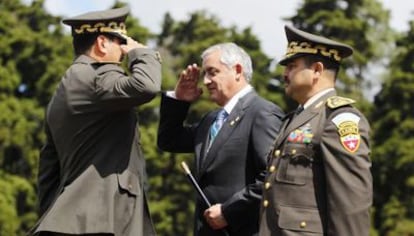Guatemala to engage army to fight crime
Country suffering soaring crime rates fueled by drug-trafficking spillover from Mexican cartels
Guatemala's new president, Otto Pérez Molina, asked the armed forces on Monday to help in the country's ongoing battle against soaring crime, fueled by the drug-trafficking spillover from the Mexican cartels.
Pérez Molina, a retired general who was sworn in on Saturday, didn't say what type of plan he will implement to combat organized crime, which has corrupted the country's institutions. But he said that he would offer resources and technology to make the military's effort easier.
"Today I ask you for your duty to comply with your constitutional mandate with the emphasis in a goal I want you to fulfill - that is to successfully stop the threats from abroad and help neutralize the illegal armed groups with your military might," Pérez Molina told the troops at an army base where he received the traditional military greeting afforded all new presidents.
The 61-year-old conservative was elected last year following a tense campaign that took a quirky turn when former first lady Sandra Torres filed for a sham divorce from her husband, President Álvaro Colom, apparently in order to skirt a constitutional ban that prohibited her from running for the nation's top office.
Pérez Molina inherits a Central American nation wracked by organized crime, violence and growing public corruption. Guatemala is one of the most dangerous nations in the world, according to the United Nations. Last year, an average of 15 people were killed each day in drug-related violence, the UN said. The previous center-left Colom government tried to weed out the corrupt through the courts and the prosecutor's office but made little headway.
In his inaugural speech, Pérez Molina pledged to make structural changes in government and asked Guatemalans to aim for true reconciliation in relation to a 36-year period of armed conflict that ended with peace accords in 1986. "I dream that mine will be the last generation of war and the first generation of peace in Guatemala," he said.
Several rights organizations have asked for investigations into retired military officers for their alleged roles in the massacre of peasants and others during Guatemala's brutal civil war. One of those accused by these groups is the former military ruler and retired general Efraín Ríos Montt, who governed from 1982-83.
End to immunity
On Monday Ríos Montt informed a Guatemala City court where he could be located and gave other personal information in case he is called to testify in an investigation into 626 massacres. In 2007, the Association for Justice and Reconciliation filed a complaint against him for genocide. But prosecutors, however, say there is no formal inquiry against Ríos Montt at this time. The former military junta leader has just lost his immunity after 12 years as a member of congress.
"If there exists any criminal persecution against me, then the right process should be followed and allow whatever court to subpoena me. I am in good health and I will be free from January 14, when I will no longer have parliamentary immunity." he said.

Tu suscripción se está usando en otro dispositivo
¿Quieres añadir otro usuario a tu suscripción?
Si continúas leyendo en este dispositivo, no se podrá leer en el otro.
FlechaTu suscripción se está usando en otro dispositivo y solo puedes acceder a EL PAÍS desde un dispositivo a la vez.
Si quieres compartir tu cuenta, cambia tu suscripción a la modalidad Premium, así podrás añadir otro usuario. Cada uno accederá con su propia cuenta de email, lo que os permitirá personalizar vuestra experiencia en EL PAÍS.
¿Tienes una suscripción de empresa? Accede aquí para contratar más cuentas.
En el caso de no saber quién está usando tu cuenta, te recomendamos cambiar tu contraseña aquí.
Si decides continuar compartiendo tu cuenta, este mensaje se mostrará en tu dispositivo y en el de la otra persona que está usando tu cuenta de forma indefinida, afectando a tu experiencia de lectura. Puedes consultar aquí los términos y condiciones de la suscripción digital.








































